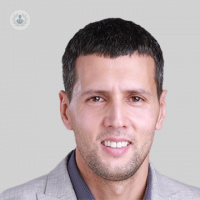Turning of the seasons: all you need to know about SAD
Written in association with:It is getting colder in the UK, and autumn steadily approaches on the winds from the east. Around this time of year, many might start to feel their good spirits decline, retreating into their rooms and no longer wishing to engage with the world. While that may be suitable for bears during hibernation, this shouldn’t be for humans, so if this is a yearly pattern of behaviour for you, you may be exhibiting signs of seasonal affective disorder. Dr Aaron Lovelle, a renowned psychiatrist, utilises his expertise on depression to tell us all about seasonal affective disorder.

Seasonal affective disorder (SAD) is a type of depression where a dip in mood reoccurs consistently around the same time of year. Most people with SAD experience this during the autumn and winter months, though there are some people who get SAD during spring and summer.
How is SAD different to depression?
SAD is distinctive from chronic depression (or major depressive disorder) even though the symptoms are very similar. SAD is solely a notable deterioration in mental health and mood as aligned with the seasons, so even if it is comorbid with pre-existing depression, SAD is specifically characterised by its temporality. Though SAD may be brushed off as “winter blues”, it is a real psychological condition.
What causes SAD?
SAD is thought to be caused mainly by the change in weather and sunlight per day (photoperiod), which is why it is most common farther away from the equator, in places where the hours of sunlight are inconsistent throughout the year. This affects the hypothalamus, resulting in the disruption of the body’s circadian rhythms, serotonin, and melatonin.
The circadian rhythm is the internal clock that helps us unconsciously keep routines, like when to eat and when to wake up. When this is disrupted, we feel disoriented and unrooted. Serotonin is a vital, multifunctional neurotransmitter that manages body temperature, focus, quality of sleep, and positive moods, so when it is dysregulated, our energy is reduced, we feel unfocused and listless, and low serotonin levels is well-known to be a common factor within those who have depression and clinical anxiety. Melatonin, the sleepy hormone, works with the circadian rhythm to program our sleepiness, and in people with SAD, it tends to be at higher levels, manifesting as oversleeping, sluggishness, and drowsiness.
What are the symptoms of SAD?
The main symptoms of SAD are:
- Increased sleep (hypersomnia)
- Persistent low mood and depression
- Loss of interest in hobbies and activities
- Irritability
- Low-self esteem
- Anxiety and stress
- Lower libido
- Seclusion and asocial behaviour
- Lethargy
- Difficulty concentrating
- Increased appetite, especially for carbohydrates
How can SAD be treated?
For some, SAD can be alleviated by simply getting enough sunlight, such as sitting by windows and going for walks. It is theorised that because the retinas process the light that enters the eye into electrical signals that tell the brain information about the outside world, to which the body responds accordingly through hormone production. If not enough light comes through, then the brain struggles to differentiate between night and day, thus leading to incorrect balances of hormones. Thus, because of the later sunrises in the wintertime, compounded by the shifting the clocks back an hour at the end of October, the body struggles to adjust to waking up in darkness.
If natural sunlight isn’t available, there are also specialised lamps called light boxes that simulate sunlight. It is thought that they help to curb the overproduction of melatonin and encourage serotonin instead, and it is recommended to use it for up to an hour each morning. This is not a suitable option for those with light sensitivity or delicate eyes.
For those whose SAD is having a significant impact on their lives, relationships, or self-esteem, there are clinical options for treatment. Cognitive behavioural therapy (CBT) and counselling can help patients manage their symptoms, express themselves without judgment, and give them tailored programmes to counteract their depression. The aim of therapy is to supply patients with the tools and support to overcome their negative feelings and fortify them against reoccurrences of SAD in the years that will follow.
For severe cases of SAD, antidepressants may be necessary. For SAD, selective serotonin reuptake inhibitors (SSRIs) are very effective, as they are designed to increase serotonin in the brain and therefore lift the mood. SSRIs are potent medication and the prescription should be adhered to as advised by the psychiatrist.
If you are worried about struggling with SAD this winter, Dr Aaron Lovelle is available for consultation via his Top Doctors profile


